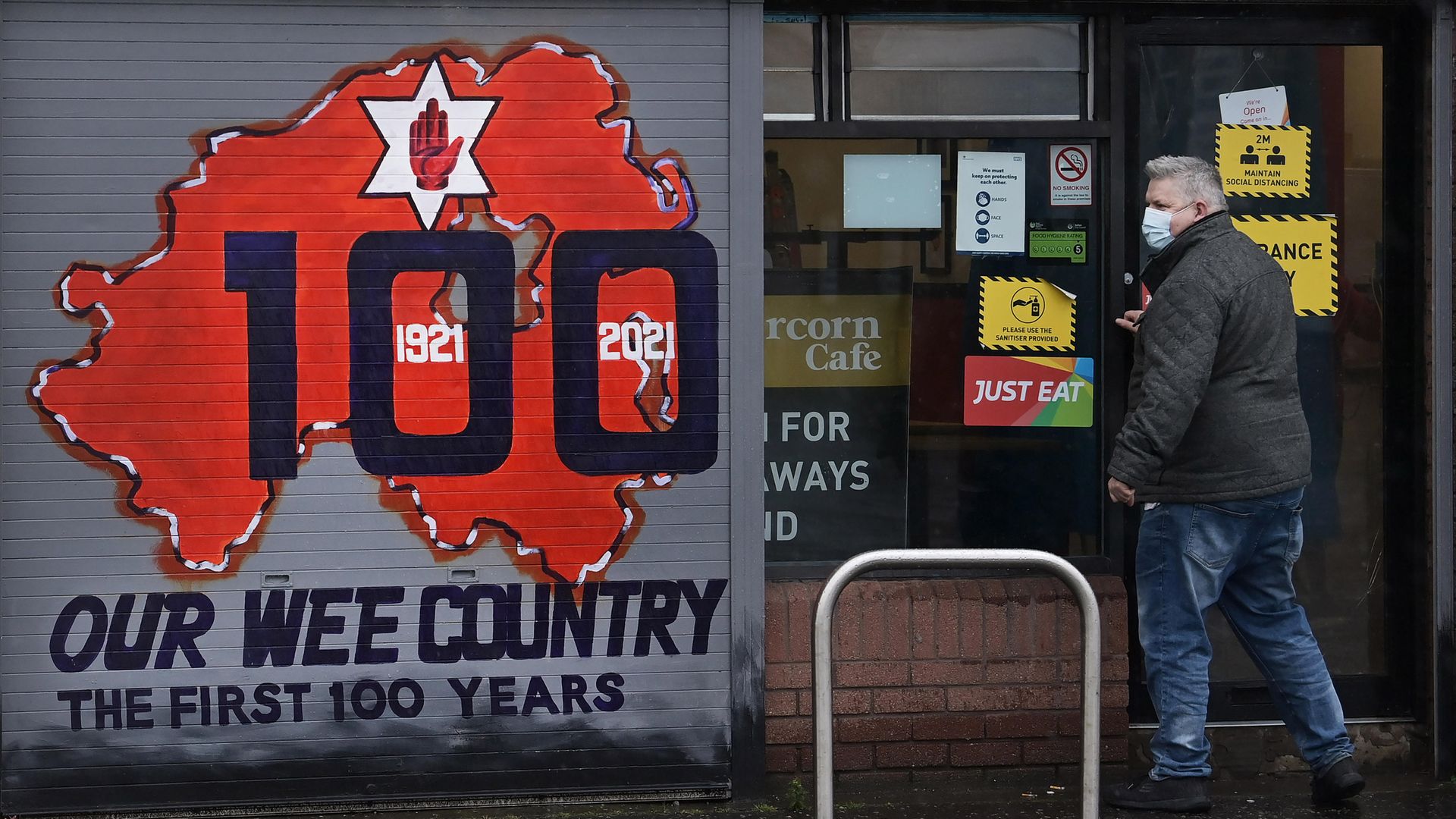
Amid the turmoil in the DUP is a deeper question for unionists… should they retrench into hard-line ‘Ulster Says No’ politics or seek a recalibration?
Wet flags flapping against telegraph poles under dark skies amid tentative post-lockdown re-openings of retail sectors on a stormy Bank Holiday Monday in Northern Ireland seemed an appropriate backdrop to yet more upheaval in its political class.
That same day, in a message to mark 100 years since the creation of the state, the Queen sent her “warmest good wishes”, though the pandemic has meant centenary celebrations are subdued, which also appears in keeping with the prevailing mood.
At any other time the ‘sacking’ of a whole party structure of Sinn Fein in Londonderry would have dominated headlines, but instead the brutal coup that deposed Arlene Foster as leader of the Democratic Unionist Party, their partners in the Northern Ireland Executive, and the subsequent scramble for leadership candidates has been taking centre-stage.
Oddly for the DUP, a party that’s been in existence for 50 years, this is its first leadership contest. Its founder, Rev Ian Paisley, bestrode Ulster politics for almost four decades as its leader, and was instrumental in delivering a workable structure for peace under the Good Friday Agreement in 1998.
Subsequent leaders, Peter Robinson and Arlene Foster, were crowned rather than elected, and already the novelty of diverse perspectives within the party – which has long been characterised as sharing with its traditional enemy SF a very strident singularity of purpose – has proved disconcerting to many within its ranks.
The first candidate to emerge in the leadership race and apparently a prime mover in the ousting of Foster was Edwin Poots, 55, a Member of the Legislative Assembly in the devolved administration at Stormont, where he is agriculture minister. His late father was a founding member of the party. A Free Presbyterian farmer and religious fundamentalist, Poots is a creationist and believes the earth is only 6,000 years old. Though popular among the party’s Paisleyite wing, others fear he would turn back the clock by taking the DUP away from Foster’s more centrist position.
His only rival so far is Sir Jeffrey Donaldson, 58, MP for Lagan Valley and leader of the DUP group at Westminster. Like Foster, in 2004 he defected from the Ulster Unionist Party to the more hard-line DUP but now would be seen to be a moderate voice whose candidacy would be regarded as more in line with Foster. Some traditional DUP members still regard Donaldson as a blow-in.
Of course, these categories are to be treated with caution. In NI politics frequently nothing is as it seems even at second or third glance.
No wonder many across the political spectrum consider this leadership election to be critical for the future, not only for Northern Ireland but also for north-south and east-west relationships.
The electoral college for the leadership poll comprises eight Westminster MPs and 28 MLAs (one does not take the party whip). We could know the result by next Wednesday. Early claims that the Poots’ camp was ahead on numbers have met with scepticism from the Donaldson team.
The catalyst for all this upheaval is Brexit and the now infamous Northern Ireland Protocol. Prime minister Boris Johnson told Foster there would be no Irish Sea border, then agreed to a partial one.
A poll laid bare its catastrophic impact upon the DUP, with support plummeting from 31% at the last general election to a disastrous 19%. With barely a year until the next assembly elections, the DUP feared the nightmare of SF emerging as the largest party and taking the symbolic post of first minister.
The ‘compromise’ of an Irish sea border as opposed to a trade policing of the existing land border has become an existential crisis for unionism in general and the DUP in particular.
Many feel Northern Ireland’s constitutional status has been undermined and accuse the EU, Dublin and Westminster of breaching the Good Friday Agreement by imposing an east-west border, when even considering a trade border between north and south is anathema.
The willingness of Brussels to use Article 16 of the Northern Ireland protocol to pressurise the UK government over Covid-19 vaccines was a spectacular own goal by the EU, managing to unite all three jurisdictions – London, Belfast and Dublin – in alarm.
But it did highlight the contentious question of Northern Ireland’s position in Ireland, in Europe and in the UK, adding a further dimension of alienation to a governance arrangement already unique within Europe. Unlike other regions, clumsiness at government level has implications rapidly at street level, as seen in the civic unrest that flared in loyalist working class areas of Belfast and some towns.
That feeling of disenfranchisement stems from a sense their status quo within the Union is now under threat. They see Northern Ireland being subsumed into an economic united Ireland as a precursor for full political unity.
Stoking fear is SF’s push for a border poll and the fact that one day soon there will be more biological nationalists than biological unionists.
That ticking clock has precluded any real overtures being made from nationalists to unionists, and even to the dismay of many, from the government which would claim jurisdiction over the million-plus unionists who live in Northern Ireland. The risks for the Republic of a sudden delivery of Northern Ireland don’t seem to have to been imagined let alone planned for.
Unionism now finds itself at a crossroads. Does it retrench into hard-line “Ulster Says No” style politics, refusing to talk to the prime minister, shunning the Taoiseach, withdrawing from north-south bodies and mobilising protests with all their attendant risks?
Or is there an appetite for recalibration? The smart money knows pro-Union sentiment is more robust than support for any and all unionist parties. A small but significant percentage of the population which would define itself as nationalist has made a pragmatic peace with the idea of the UK and its benefits, not the least of which is familiarity. At any rate there is a larger electorate possible for unionism than there is for nationalism. There is room for cross community consent to the Union.
Harnessing that sentiment would present grounds for real optimism – not only for the longer-term future of the Union, but also for all the things that make for stability: wellbeing, infrastructure, trade, jobs, in partnership with London and Dublin. It’s about people living in peace and prosperity in a structure of government which palpably works.
To take advantage of that however, the DUP must find a way of accommodating itself with a rapidly changing Northern Ireland. Its stances on same sex marriage and abortion make it seem anachronistic and out of touch with modern realities to many. Voting unionist should be simply that – supporting the Union – not also signing up to a series of stances on social issues.
Many believe it would help too if the EU prioritised stability in Northern Ireland over grandstanding about Brexit.
Supporters of Edwin Poots say he’s a pragmatist, pointing to his acceptance of the legal requirement to carry out physical post-Brexit checks at NI ports though he was initially responsible for blocking the construction of infrastructure to carry them out.
Sir Jeffrey Donaldson also has spoken of finding pragmatic solutions to the protocol. Launching his leadership bid, he talked of building “a shared future for Northern Ireland” and mentioned something else too: that the next century would be built on “the politics of persuasion”.
Many see this as a necessary ingredient perhaps hitherto missing from the DUP DNA which may unlock goodwill not only across NI but also in London, Dublin and Brussels as well.
It would be the moment when the population regarded as everybody’s problem actually becomes the solution.
Gail Walker is the Belfast Telegraph’s editor-at-large










